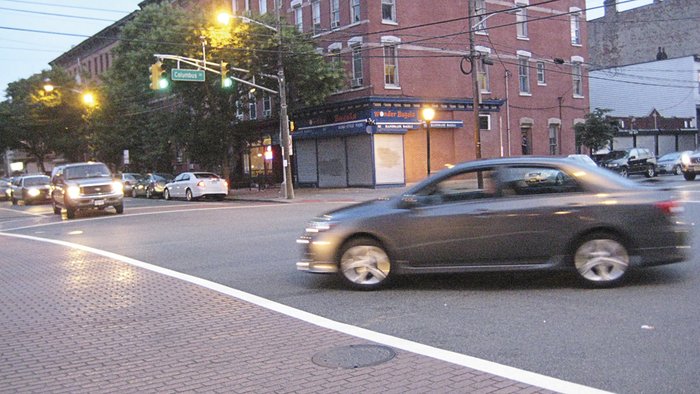Do those notorious red light cameras around Jersey City and other cities really lower car crashes – or lead to more accidents than standard traffic signals? That is a question that’s being hotly debated by motorists who have been ticketed after allegedly being caught on camera running red lights.
A recent decision by the New Jersey Department of Transportation (NJDOT) to suspend the issuance of tickets at 63 intersections in the state outfitted with red light cameras initially led to relief among drivers who have been fined after being caught running lights. The suspension of the program was particularly felt in Newark, where all of that city’s red light cameras will stop issuing tickets until the system can be recalibrated and improved.
Of the 13 red light cameras that have been in operation in Jersey City, one has been suspended.
____________
Indeed, last week the city announced that yet another Jersey City intersection has been outfitted with a red light camera. This camera at this intersection, at Newark and Wallis avenues, began a one-month warning/trial period on July 5. During this trial, the camera will take still photos and video footage of cars that speed through red lights. Violators will receive written warnings in the mail, but will not be fined during the trial period. After the trial period ends on August 4 motorists will start receiving fines for violations.
Cities love ’em, drivers hate ’em
Municipalities love the controversial cameras. They generate quick cash (the municipality splits the proceeds with the state) and force speeding drivers to slow down – without the need for police personnel to monitor dangerous intersections and write tickets. This year alone, Jersey City expects to bring in $2 million from fines issued through its network of red light cameras, after fees and expenses, according to a city spokeswoman. Reliance on red light cameras also allows the police department to redeploy officers from traffic duty to other functions.
But many drivers say the camera systems are unfair. They claim the camera systems unjustly target people who were in an intersection during a yellow light and also ticket drivers who entered an intersection on a green light, but who then had to wait for oncoming traffic to pass before they could make a left turn.
The presence of cameras at notorious intersections has, some drivers say, forced them to change where and how they drive.
“I no longer take my old route to work,” said one motorist who has been fined twice after being caught running red lights. “Now I go through residential neighborhoods where I have more stop signs and fewer red lights.”
This motorist claims his tickets were issued when the traffic lights were yellow, not red.
Other drivers admit the camera systems have led them to treat yellow lights as if they were red – a bad habit that can lead to more rear end collisions.
“I stop on yellow,” said resident Monica Foy. “I got a ticket last year. I was taught that if you are already in the intersection when the light turns red you keep going. I believe that’s what I did when I got my ticket…The same thing happened to my boyfriend. Now I won’t take the chance.”
According to the NJDOT there is a formula that is supposed to determines the length of time a camera-equipped traffic light should be yellow. This length of time differs from the standard length of time at regular traffic signals that do not have cameras. Throughout the state, traffic signals equipped with cameras may need to be re-set so that drivers are not getting tickets for driving through yellow lights.
Overall crashes down?
There are roughly 86 intersections statewide that are equipped with cameras that monitor traffic signal violations. The cameras are part of a five-year pilot program that went into effect in 2009 and, according to the NJDOT, “aims to determine whether red light cameras promote safety by reducing the frequency and severity of crashes at intersections that have a history of motorists running red lights.”
But some motorists question whether the camera systems – which are currently being tested out in 25 New Jersey municipalities – prevent accidents or cause them.
The NJDOT maintains the cameras have reduced accidents and, possibly, saved lives.
“Under the five-year pilot program we have to provide an annual report on all of the data, both summonses as well as crashes,” said NJDOT spokesman Tim Greeley. “We have to look at rear-end collisions, as well as the much more dangerous and, possibly, fatal side crashes.”
Each November, Greeley said, the department issues a report that looks at summonses and crashes at intersections that have had operational red light cameras for at least one full year. (Cameras and intersections that have been in effect for less than a full year are not included in the annual report.)
The November 2011 report, which included data from only two intersections, “total crashes are down 45 percent…right-angle crashes are down 57 percent, and same direction crashes are down 50 percent. When crash severity is factored into the equation, the overall cost of these crashes …was reduced by an estimated $149,000.”
The report concluded that while the cameras appear to have a beneficial impact on the number, severity, and cost of crashes, the NJDOT believes “the date [is] too limited to draw any meaningful conclusions at this time.”
The 2011 annual report did not include data on any of the intersections in Jersey City since none of them had been in operation for a full year when the report was drafted. The 2012 report will have more crash data for Jersey City.
E-mail E. Assata Wright at awright@hudsonreporter.com.
